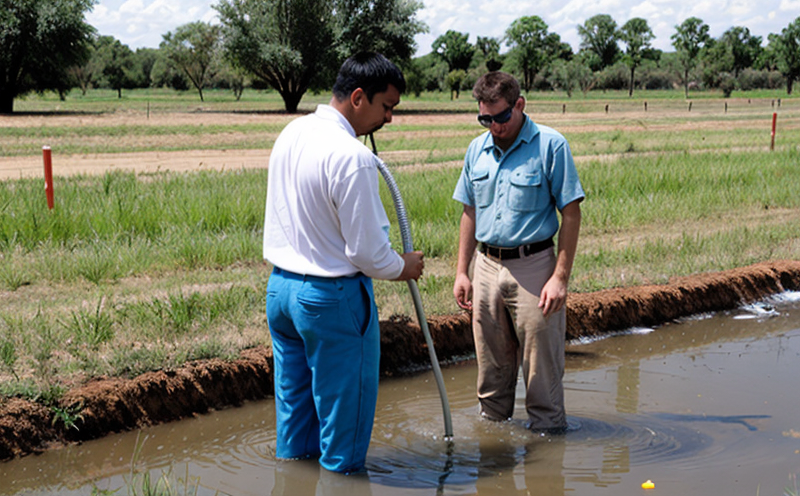ASTM D5673 Arsenic Determination Test in Groundwater
The ASTM D5673 standard specifies a method for determining arsenic in groundwater by means of inductively coupled plasma optical emission spectrometry (ICP-OES). This test is crucial for ensuring that drinking water meets the stringent safety standards set forth by regulatory bodies such as the Environmental Protection Agency (EPA).
The process involves several steps, each critical to achieving accurate and reliable results. Groundwater samples are first collected using appropriate sampling protocols which ensure that they represent the source accurately. The samples must then be transported under conditions that prevent contamination or degradation.
Upon arrival at the laboratory, the samples undergo rigorous preparation procedures designed to remove any potential interferences from the analysis. These steps may include dilution if necessary and the addition of preservatives to stabilize the sample. Once prepared, the samples are analyzed using ICP-OES instrumentation, which provides highly sensitive detection limits for arsenic.
The accuracy and precision of results depend heavily on several factors including the quality control measures implemented during sampling and preparation phases, as well as the proficiency of analysts operating the analytical equipment. It is essential that all personnel involved in these processes adhere strictly to established protocols to minimize errors and ensure compliance with international standards like ASTM D5673.
The report generated from this testing provides detailed information about arsenic levels present in the groundwater sample. This includes not only quantitative data but also qualitative insights into potential sources of contamination or other relevant findings that could impact public health or environmental quality.
Regulations regarding safe drinking water vary by country and region; however, many jurisdictions have adopted guidelines based on World Health Organization (WHO) recommendations which set maximum allowable concentrations for arsenic in potable water supplies. Compliance with these regulations is vital not only from a legal standpoint but also to safeguard human health.
Given the importance of accurate arsenic determination tests in protecting public welfare, laboratories specializing in environmental testing must possess state-of-the-art facilities equipped with advanced analytical tools capable of providing precise measurements down to very low concentrations. Additionally, experienced staff who are thoroughly trained on these methods play a key role in delivering reliable results.
By adhering strictly to ASTM D5673 procedures and using certified reference materials during calibration checks, laboratories can ensure consistent quality across all analyses performed. Furthermore, regular internal audits combined with external accreditation programs help maintain high standards of performance throughout the organization.
In conclusion, implementing proper sampling techniques coupled with advanced analytical capabilities allows for accurate determination of arsenic levels in groundwater samples according to ASTM D5673 guidelines. Such precision is necessary not only for regulatory compliance but also to protect public health and environmental integrity.
Industry Applications
- Drinking Water Treatment Plants
- Water Quality Monitoring Agencies
- Environmental Consulting Firms
- Agricultural Companies
- Government Regulatory Bodies
- Oil and Gas Industry for Site Remediation
- Pharmaceutical Manufacturers
- Public Health Authorities
Eurolab Advantages
Eurolab, with its extensive network of accredited laboratories across Europe, offers unparalleled expertise in performing ASTM D5673 arsenic determination tests. Our state-of-the-art facilities are equipped with the latest instrumentation, ensuring accurate and reliable results every time.
The highly skilled technicians at Eurolab are fully trained on all aspects of this test method, including proper sample preparation techniques and best practices for minimizing contamination risks during analysis. This expertise translates into consistent high-quality outputs that meet or exceed international standards.
Our comprehensive quality assurance program includes regular internal audits as well as participation in proficiency testing programs recognized worldwide. These initiatives help us continuously improve our laboratory operations while maintaining strict adherence to regulatory requirements.
In addition, Eurolab provides detailed reports for each analysis conducted, which include not only quantitative data but also insights into potential sources of contamination or other relevant findings that could impact public health or environmental quality.
Why Choose This Test
The ASTM D5673 arsenic determination test is essential for ensuring compliance with stringent safety standards set forth by regulatory bodies such as the EPA. By detecting even trace amounts of arsenic in groundwater, this method helps protect public health and environmental integrity.
This test plays a critical role in several key areas:
- Drinking Water Treatment Plants: Ensures that treated water meets safety standards before being distributed to consumers.
- Water Quality Monitoring Agencies: Provides reliable data for monitoring changes over time and identifying trends or issues requiring further investigation.
- Environmental Consulting Firms: Offers valuable information when assessing risks associated with specific sites or areas of concern.
- Agricultural Companies: Helps determine whether irrigation practices pose any threat to crop quality or soil health.
- Government Regulatory Bodies: Facilitates enforcement of regulations aimed at safeguarding public welfare and natural resources.
- Oil and Gas Industry for Site Remediation: Assists in identifying and addressing contamination issues resulting from past operations.
- Pharmaceutical Manufacturers: Ensures product safety throughout the supply chain.
- Public Health Authorities: Supports decision-making processes related to health policies and interventions.
The precision achieved through this method is vital for protecting public health, ensuring compliance with legal requirements, and maintaining environmental sustainability. Therefore, choosing ASTM D5673 ensures that you receive accurate results that can be trusted in making informed decisions.





